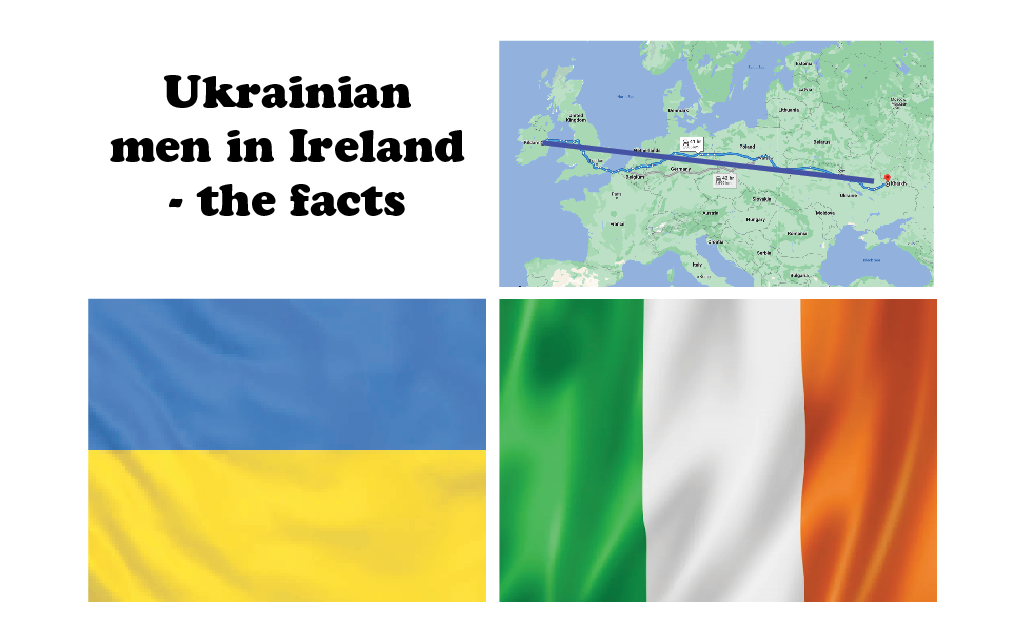Ukrainian men are allowed to leave their country, despite the war, when they meet certain criteria.
Full details below, but in brief the following men are currently exempt from being called up:
1. Men who support three or more children under the age of 18;
2. Men who are single-handedly raising a child (or children) under the age of 18;
3. Men who are caregivers, guardians, foster parents, or educator-parents raising a child with a disability;
4. Men supporting an adult with a disability;
5. Adoptive parents, caregivers, foster parents, and educator-parents supporting orphaned children;
6. Men providing continuous care for a sick spouse, child, or their own parents or their spouse’s parents, as determined by a medical commission or a health care institution.
CRITERIA IN FULL:
The Law of Ukraine on Mobilisation, including amendments, is as follows as of March 10, 2024. The translation was provided to Changing Ireland by a Ukrainian refugee now working in community development in Ireland. Ukrainian speakers can read the original text here: Law of Ukraine on Mobilisation (with current amendments).
Article 23 – Postponement of call-up for military service during mobilisation states the following:
The following persons are not subject to call-up for military service (for the period of mobilisation and for wartime by state authorities, other state bodies, local self-government bodies, as well as by enterprises, institutions and organisations in accordance with the procedure established by the Cabinet of Ministers of Ukraine):
– Those duly recognised as persons with disabilities or, in accordance with the conclusion of a military medical commission, temporarily unfit for military service for health reasons for a period of up to six months (with subsequent passing of a military medical commission);
– Women and men with three or more dependent children under the age of 18;
– Women and men who are raising a child (children) under the age of 18 on their own;
– Women and men, guardians, trustees, foster parents, foster parents raising a child with a disability under the age of 18;
– Women and men, guardians, trustees, foster parents, foster parents raising a child with severe perinatal nervous system disorders, severe congenital malformations, rare orphan diseases, oncological, onco-haematological diseases, cerebral palsy, severe mental disorders, type I diabetes mellitus (insulin-dependent), acute or chronic kidney disease of the IV degree, a child who has been seriously injured, needs an organ transplant, or requires palliative care, as evidenced by a document issued by the medical advisory commission of a healthcare facility in accordance with the procedure and form established by the central executive body responsible for the formation and implementation of state policy in the field of healthcare, but who has not been diagnosed with a disability;
– Women and men with a dependent adult child who is a person with a disability of group I or II;
– Adopters, guardians, trustees, foster parents, foster parents who depend on orphans or children deprived of parental care under the age of 18;
– Those engaged in permanent care for a sick wife (husband), child, or parents of their own or their wife (husband), who, according to the conclusion of the medical and social expert commission or the medical advisory commission of a healthcare institution, need permanent care;
– Those who have a spouse with a disability and/or one of their parents or the parents of their spouse with a disability of group I or II, provided that such persons with disabilities have no other able-bodied persons obliged by law to support them;
– Guardians of a person with a disability declared incapacitated by a court; persons engaged in the permanent care of a person with a disability of group I; persons engaged in the permanent care of a person with a disability of group II or a person who, according to the conclusion of a medical and social expert commission or a medical advisory commission of a healthcare institution, needs permanent care, in the absence of other persons who can provide such care;
– Women and men who have a minor child/children and a husband/wife who is performing military service;
– People’s deputies of Ukraine, deputies of the Verkhovna Rada of the Autonomous Republic of Crimea;
– Employees of military command and control bodies, military units, enterprises, institutions and organisations of the Ministry of Defence of Ukraine, the Armed Forces of Ukraine, the State Service for Special Communications and Information Protection of Ukraine, the Security Service of Ukraine, the Foreign Intelligence Service of Ukraine, the National Guard of Ukraine, the State Border Guard Service of Ukraine, the National Police of Ukraine, the Bureau of Economic Security of Ukraine, the National Anti-Corruption Bureau of Ukraine, the State Bureau of Investigation, the State Enforcement Service;
– Persons with disabilities, as well as persons referred to in paragraphs four to twelve of part one of this Article, may be called up for military service during the specified period with their consent and only at their place of residence.
The following persons are not subject to call-up for military service during mobilisation or for a special period:
– Students of vocational (vocational-technical), professional higher and higher education, trainee assistants, postgraduate students and doctoral students studying in full-time or dual forms of education;
– Research and teaching staff of higher and vocational higher education institutions, scientific institutions and organisations who have an academic title and/or a scientific degree, and teaching staff of vocational (vocational) education institutions, general secondary education institutions, provided that they work at least 0.75 times as full-time at their main place of work in higher or vocational higher education institutions, scientific institutions and organisations, vocational (vocational) or general secondary education institutions;
– Women and men whose close relatives (husband, wife, son, daughter, father, mother, grandfather, grandmother or sibling (full or half) were killed or went missing during the anti-terrorist operation;
– Persons liable for military service during partial mobilisation are not subject to call-up for military service within six months from the date of discharge from military service from among citizens who were called up for military service during mobilisation and discharged from reserve service (except for servicemen enlisted in the military operational reserve of the first priority). Such persons may be called up for military service during this period upon their consent.
– Men who have reached the age of 60 are not subject to mobilisation, as they have reached the age limit for remaining in the reserve of the Armed Forces of Ukraine and other military formations. Upon reaching the age limit a man is excluded from military registration.
Who in Ukraine can be mobilised in 2024?
According to the Law of Ukraine On Military Duty and MilitaryService, the following categories of men can be mobilised:
– military personnel (including contractors) who have completed their service before 24 February 2022, have not reached the age limit for service and are medically fit;
– men between the ages of 25 and 60 who are medically fit and have no prior military service experience;
– men aged 18 years or older who have agreed to contract service;
– men with and without military service experience who are restricted during martial law;
– those removed and excluded from the military register before 24 February 2022, fully or restrictedly fit for service during martial law by decision of the military medical commission ;
– persons with disabilities, if they mobilise voluntarily;
– persons entitled to deferment for family reasons may be mobilised only voluntarily for service at their place of residence.
More than 4,200 amendments were made to the draft law on mobilisation. Some of the proposals were rejected, but some remained, including those related to draft dodgers. Among them were a ban on travelling abroad and a ban on driving.
This bill is now due to be voted on by the Verkhovna Rada at the end of March. There may be more amendments.





